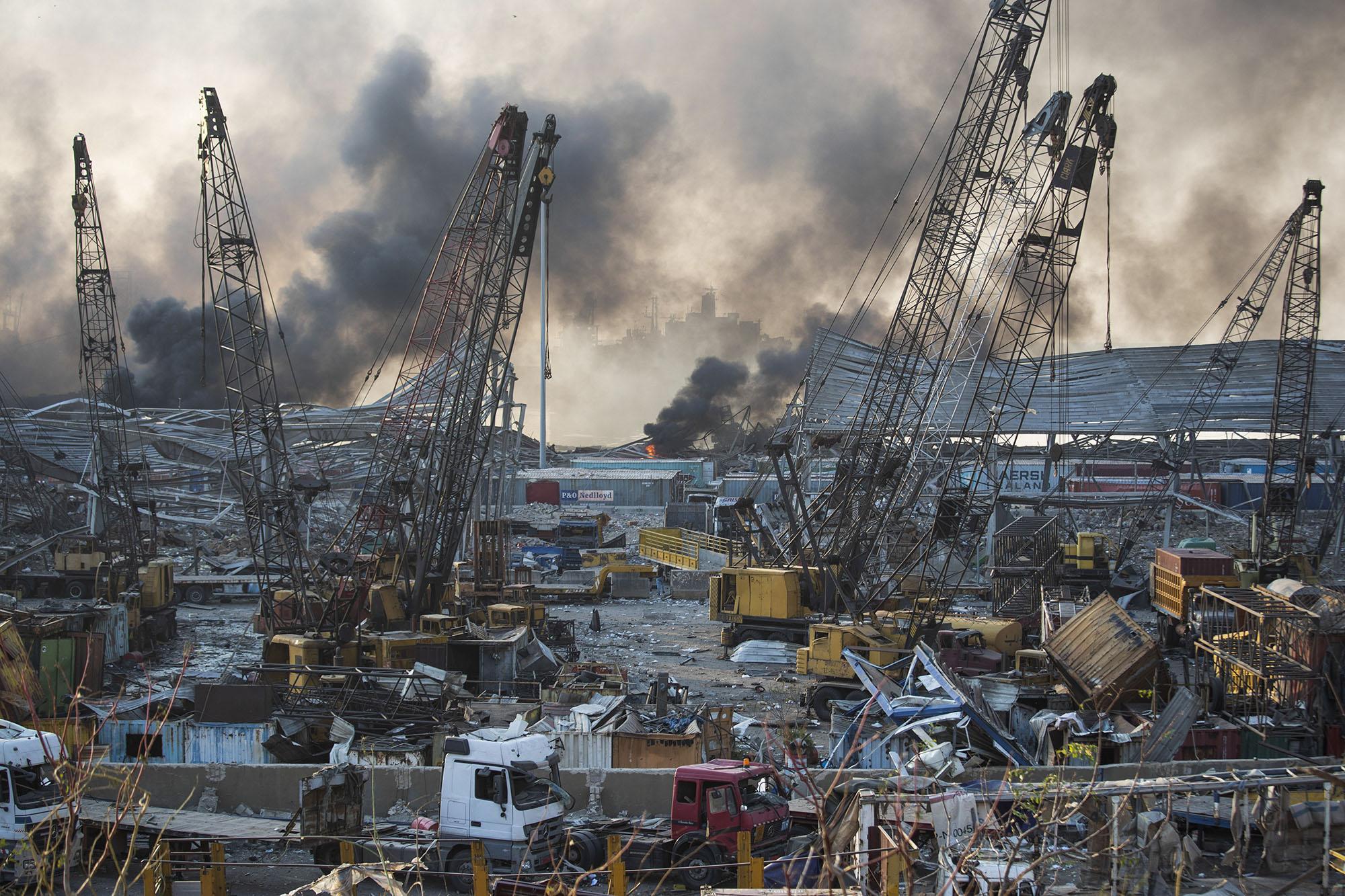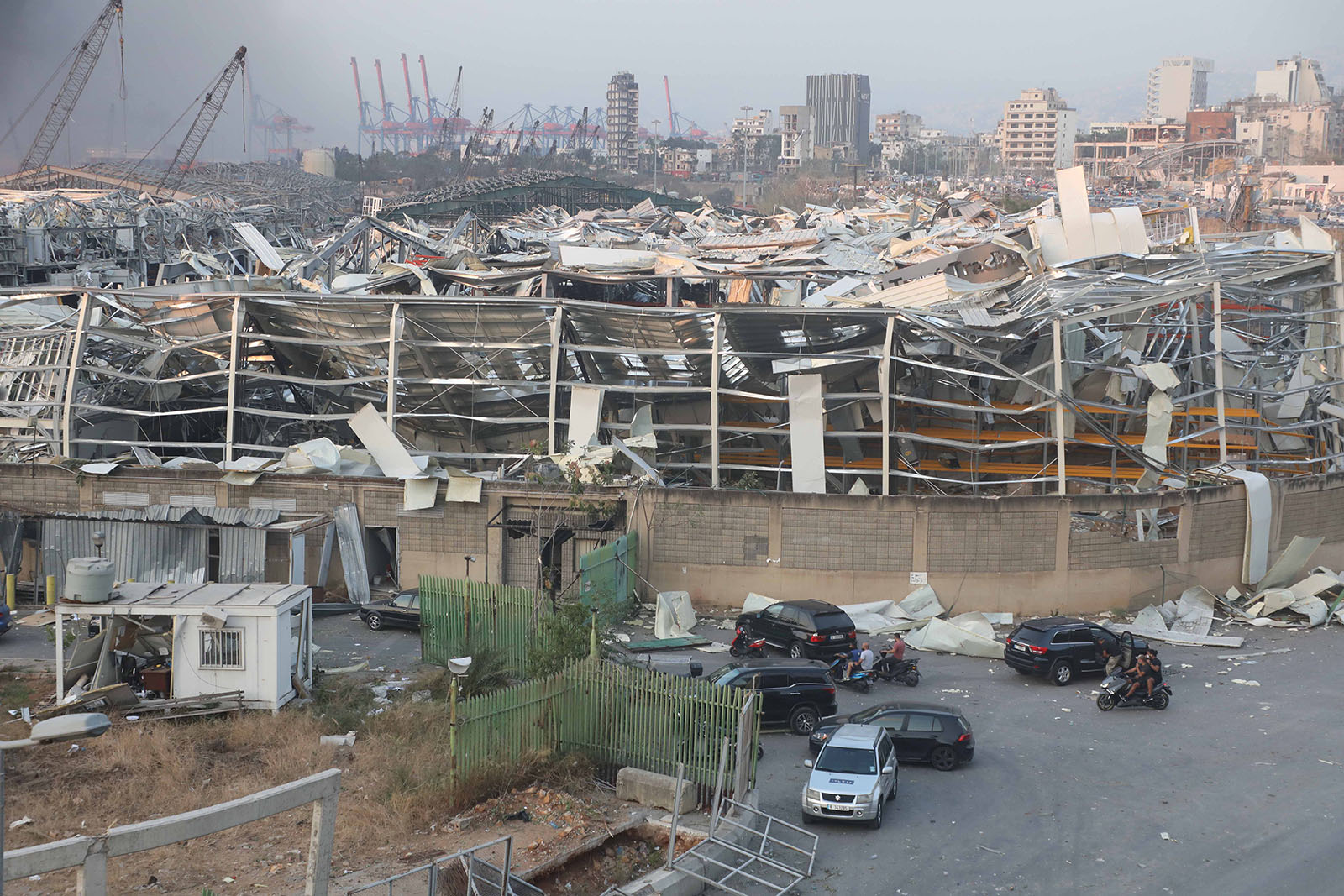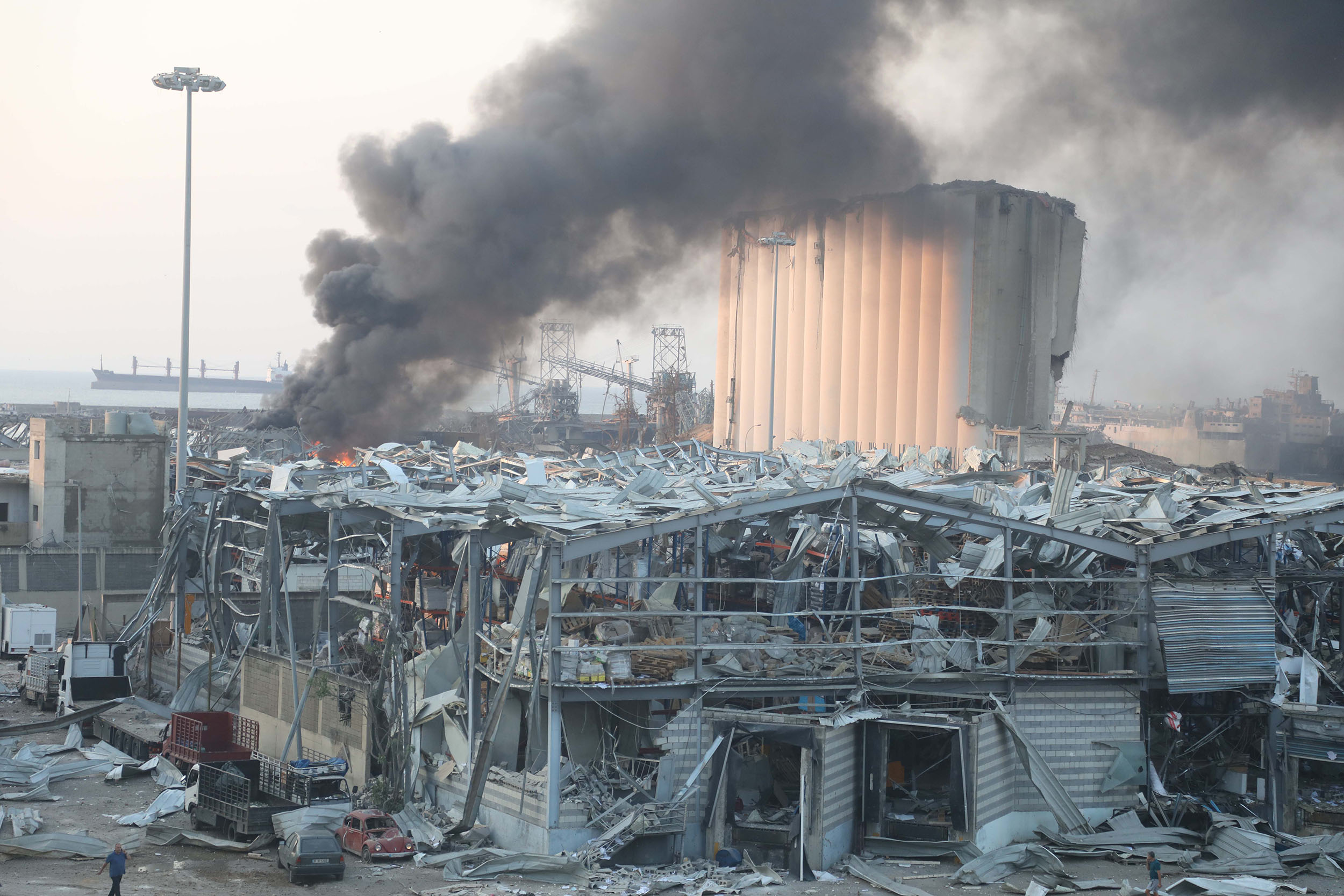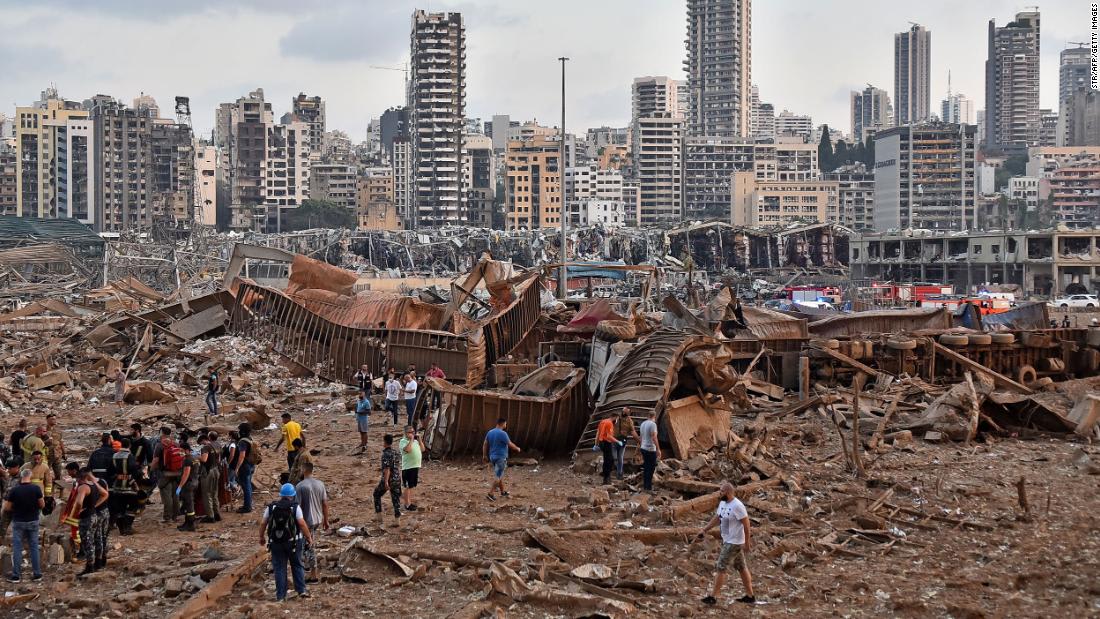Journalist who lives near the port says the blast sounded like a "jet breaking the sound barrier"
Leila Molana-Allen, a journalist with France 24 in Beirut, lives about a kilometer away from Beirut's port.
She said the explosion caused a blinding white light and "ripped" the doors and windows out of her apartment.
"When I stood up, the entire apartment was covered in debris and glass," she said.
Watch her interview with CNN:
Ammonium nitrate stored in a warehouse is being linked to the explosion
From CNN's Helen Regan, Tamara Qiblawi, Ghazi Balkiz and Ben Wedeman
A warehouse storing thousands of tons of unsecured highly explosive material has emerged as a possible source of the massive blast that ripped through the Lebanese capital on Tuesday, killing at least 80 people, injuring 4,000 and sending a shock wave across the city that damaged buildings and blew out windows up to 10 kilometers (6 miles) away.
Lebanon's Prime Minister Hassan Diab said that 2,750 metric tons of ammonium nitrate, which is typically used as an agricultural fertilizer, had been stored for six years at a port warehouse without safety measures, "endangering the safety of citizens," according to a statement.
It's still not exactly clear what led to the ignition that wiped out entire streets across the seaside capital.
Initial reports in state media blamed the blast on a major fire at a firecrackers warehouse near the port, that likely spread to nearby buildings. However, the Prime Minister's account appeared to be backed by Lebanon's General Security chief Abbas Ibrahim, who said a "highly explosive material" had been confiscated years earlier and stored in the warehouse, just minutes' walk from Beirut's shopping and nightlife districts.
As Beirut's 4 million residents wake to the full horror and scale of the damage to their city, lives, and livelihoods, questions will be asked about why such large quantities of the dangerous chemical were allowed to be stored in the middle of the city without adequate safety measures, and who is responsible.
Read more:
One Indonesian citizen was hurt in the blast
From CNN's Jadyn Sham
An Indonesian national was "slightly injured" in Tuesday's explosion in the Port of Beirut, the country's Embassy in Lebanon said.
The embassy facility, which is located fewer than 10 kilometers (6 miles) from the port, was not damaged, said Basyiruddin Hidayat, an official with the Embassy of Indonesia in Beirut.
Hidayat said that according to the embassy's records, there are 1,447 Indonesian citizens in Lebanon, all of whom appear to be safe.
Beirut explosion death toll rises to 80
From CNN's Charbel Mallo in Abu Dhabi
At least 80 people have died and more than 4,000 were wounded after the massive explosion in central Beirut on Tuesday, Lebanon's Health Minister Hamad Hassan said Wednesday morning.
Hassan said four hospitals are out of service because of damage from the blast.
He said the death toll will likely increase.
"This is not just ammonium nitrate," former CIA operative says of explosion
Robert Baer, a former CIA operative with extensive experience in the Middle East, said videos of Tuesday's blast showed that while ammonium nitrate may have been present in the warehouse, he does not believe it was responsible for the massive explosion that ensued.
Initial reports blamed the blast on a major fire at a warehouse for firecrackers near the port, according to Lebanese state news agency NNA.
Lebanon's Prime Minister, Hassan Diab, later said that 2,750 metric tons of ammonium nitrate, a highly explosive material used in fertilizers and bombs, had been stored for six years at a port warehouse without safety measures, "endangering the safety of citizens," according to a statement.
Baer said he thinks that there were military munitions and propellants present. He speculated it could have been a weapons cache, but it's unclear who it belongs to.
"It was clearly a military explosive," he said. "It was not fertilizer like ammonium nitrate. I'm quite sure of that."
"You look at that orange ball (of fire), and it's clearly, like I said, a military explosive."
Baer noted that white powder seen in the videos of the incident before the major blast are likely an indicator that ammonium nitrate was present and burning. He also noticed a lot of munitions going off ahead of the larger explosion.
No evidence of an attack: Baer said while he believes the explosion does not look like solely ammonium nitrate, there's still no evidence that this was an attack. The government has blamed poor management and vowed to get to the bottom of it.
Baer isn't confident we'll ever know the truth.
"I've worked in Lebanon for years, and no one is going to want to admit they kept military explosives at the port. It's a stupid thing to do."
Investigation launched: Prime Minister Diab's account appeared to be backed by Lebanon's General Security chief Abbas Ibrahim, who said a "highly explosive material" had been confiscated years earlier and stored in the warehouse, just minutes' walk from Beirut's shopping and nightlife districts.
The Prime Minister has launched an investigation into the explosion, saying he "will not rest until we find those responsible for what happened, hold them accountable, and impose maximum punishment."
As yet, there is no clear evidence to suggest the source of the blast.
What is ammonium nitrate?
From CNN's Jessie Yeung
 Smoke rises in the aftermath of a massive explosion in Beirut, Lebanon, on Tuesday, August 4. Hassan Ammar/AP
Smoke rises in the aftermath of a massive explosion in Beirut, Lebanon, on Tuesday, August 4. Hassan Ammar/APAuthorities are still investigating what exactly caused Tuesday's deadly explosion in Beirut, but public statements from key Lebanese officials have begun to focus on ammonium nitrate that was kept in a warehouse near the port.
Lebanon's Prime Minister Hassan Diab said in a statement that an estimated 2,750 metric tons of the substance had been stored there for the past six years. Lebanon's general security chief said the "highly explosive material" had been confiscated several years ago.
Ammonium nitrate, a compound of ammonia and nitrogen, is best known for being used in fertilizers and -- because it's incredibly volatile -- bombs.
The bombing of the Alfred P. Murrah Federal Building in Oklahoma City in 1995, which killed 169 people and injured 467, was carried out using two US tons of ammonium nitrate.
One of the worst accidents in US history involving a form of ammonia occurred in April 1947, when a ship loaded with ammonium nitrate caught fire while docked in Texas City.
The blaze caused an explosion and additional fires that killed almost 400 people and damaged more than 1,000 buildings, according to the website of the Texas Historical Association. The explosion was triggered by 2,300 US tons of ammonium nitrate, according to US Homeland Security.
This man watched the chaos unfold in Beirut, as his wife stayed on the phone thousands of miles away
From CNN's Angus Watson in Sydney
 Serge Mahdessian and his wife Deanna Torus. Photo supplied by Deanna Torus.
Serge Mahdessian and his wife Deanna Torus. Photo supplied by Deanna Torus.Hairdresser Serge Mahdessian was working roughly 8,500 miles away from his wife, who was asleep in Melbourne, Australia when the explosion destroyed his salon in the Ashrafieh district of Beirut.
Phone footage taken by Mahdessian shows crumpled cars lining a street strewn with broken glass and rubble.
Awoken in the night: The call from his wife, Deanna Torus, came quickly -- she’d been woken in the middle of the night with news of the massive blast just a short distance north of where her husband was at work.
Separated for years: The young couple married last year after five and a half years together, but are used to being separated. Serge’s visa application, a process that has cost about $7,000 to date, has been rejected multiple times.
Covid-19 travel bans have piled on the misery.
“We’re mentally and physically exhausted. We’ve been together for five and a half years, refused visas and when I thought, what’s next? I never thought that it would be an explosion down the street from where my husband works,” Torus said.
Australia has a large community of Lebanese expatriates and people of Lebanese descent. The 2016 census determined that there are around 75,000 Australians with Lebanese heritage, mostly living in Melbourne and Sydney. The Australian government believes that there were 20,000 Australians in Lebanon before expats returned from around the world due to Covid-19.
The nightmare continues for Mahdessian, who says that the collapsed Lebanese economy, Covid-19 and an accident of this magnitude have made Beirut "unsafe."
Mahdessian said his aunt, a nurse, was receiving treatment for a broken shoulder and a head injury after a wall fell on her while working a shift in an Ashrafieh hospital.
He said they had to take her to another hospital because "no one was accepting people."
"The emergency room looked like a war had begun, the children -- their hands, their legs, I couldn’t believe what I was seeing," he said.
Latin American countries react to Beirut explosion
From CNN's Radina Gigova in Atlanta
 Damaged buildings are seen after the explosion at the port of Beirut, Lebanon, August 4. Bilal Jawich/Xinhua/Getty Images
Damaged buildings are seen after the explosion at the port of Beirut, Lebanon, August 4. Bilal Jawich/Xinhua/Getty ImagesMore countries in Latin America are sending their condolences to the Beirut explosion victims and relatives.
The region is home to a large diaspora of Lebanese expatriates and people of Lebanese descent.
Brazilian President Jair Bolsonaro said on his official Twitter account Tuesday evening that he is "deeply saddened by the scenes of the explosion in Beirut. Brazil is home to the largest community of Lebanese in the world and, therefore, we feel this tragedy as if it were in our territory. I express my solidarity with the families of the fatal victims and the wounded."
Mexico's President Andres Manuel Lopez Obrador said Tuesday evening on his official Twitter account: "Sad and unfortunate the situation in Beirut, Lebanon. Our condolences to the families of the victims and to the entire sister nation."
Panama's Foreign Ministry tweeted: "The National Government expresses its deep dismay at the terrible explosion that occurred in Beirut, while expressing its solidarity with the Republic and the People of Lebanon and expressing its condolences to the families of the deceased and injured."
And Ecuador's Foreign Ministry said: "Ecuador stands in solidarity with the Republic of Lebanon in light of the explosions registered in its capital, Beirut. @CancilleriaEc expresses its condolences to the families of the deceased." The ministry said 150 Ecuadorians reside in Lebanon and "so far there are no victims."
Explosives expert shares his thoughts on video from the scene
 Smoke rises from an explosion site at the port of Beirut, Lebanon, on August 4. Bilal Jawich/Xinhua via Getty images
Smoke rises from an explosion site at the port of Beirut, Lebanon, on August 4. Bilal Jawich/Xinhua via Getty imagesTony May, a former explosives investigator for the US Department of Alcohol, Tobacco and Firearms, told CNN that video of the blast in Beirut offers important clues to what happened.
No yellow smoke: May said when he was in Baghdad, the telltale sign of an ammonium nitrate explosive was a yellow smoke cloud. The pink or red cloud that was seen, he said, was "not consistent with ammonium nitrate."
However, May said that doesn't necessarily mean ammonium nitrate wasn't involved. It could just mean there were "other items as well," he said.
White flashes: The white flashes seen in different parts of the video may indicate that smaller explosions were occurring in the lead-up to the large shockwave, May said.

 5 years ago
634
5 years ago
634 


